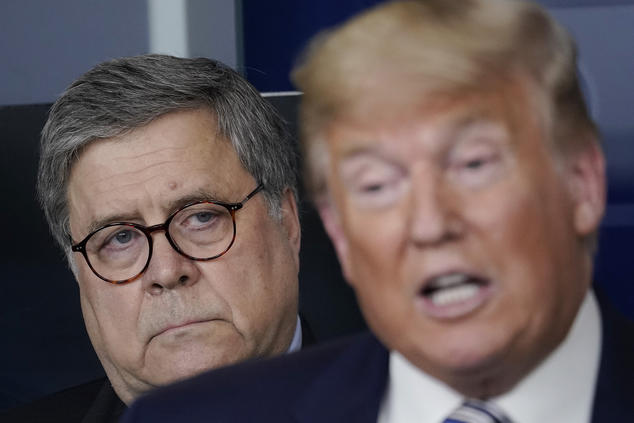It’s a danger to the republic.
U.S. Attorney General William Barr (left) and U.S. President Donald Trump at the White House in March
Drew Angerer/Getty Images
In late 2017, President Trump’s short-lived national security adviser, former U.S. Army Lieutenant General Michael Flynn, pleaded guilty to lying to FBI agents investigating Russian attempts to influence the 2016 presidential election in favor of Donald Trump.
On Wednesday, following pressure from Attorney General William Barr to drop the case, a federal appeals court ordered a lower court judge to dismiss the charges against Flynn.
“Great!” President Trump responded in a Tweet. Or, as Justice Department spokeswoman Kerri Kupec chimed in, “WIN in General Flynn’s case,” adorning her Tweet with four American flag emojis.
Putting a political thumb on the scales of justice is hardly patriotic. It’s more suggestive of the abuse of power that poisons the judiciary in authoritarian states.
“In the United States of America, we do not prosecute people based on politics, and we don’t cut them a break based on politics either,” Aaron Zelinsky, a Justice Department prosecutor, testified before the House Committee on the Judiciary on Wednesday.
Zelinsky wasn’t testifying about the Flynn case, though, but yet another instance in which Trump and Barr put politics before justice.
Trump’s friend and former campaign adviser, Roger Stone, was convicted last fall of witness tampering and obstructing the congressional investigation into Russia’s election interference. In February, Barr overruled prosecutors in the case to recommend a lighter sentence for Stone than prosecutors had suggested.
“Roger Stone was treated differently because of politics,” said Zelinsky. He and three other federal attorneys who prosecuted Stone withdrew from the case in protest but Trump praised Barr “for taking charge” and rolling back the sentencing guidance.
Roger Stone makes his exit from federal court following his sentencing to 40 months in prison.
Rod Lamkey Jr./SIPA USA via Associated Press
Trump is working, with Barr’s help, to politicize our justice system, using it to reward those who support him, punish those who do not, and remove from office those who put allegiance to justice under the law above personal loyalty to Trump.
That doesn’t seem to be a problem for Barr.
Last weekend, Barr sacked Geoffrey Berman, U.S. Attorney for the Southern District of New York.
Berman, a Republican and Trump supporter, was the president’s pick for the post just two years ago. He was fired amid a flurry of confused and contradictory explanations from Trump, Barr, and the White House press secretary.
None could explain why Berman was abruptly fired five months before the presidential election, at a time when he was overseeing investigations into Trump’s personal attorney, former New York mayor Rudy Giuliani; Trump’s long history with Deutsche Bank, which has loaned him more than $2 billion; and allegations that Trump tried to derail a federal investigation into Halkbank, a state-owned Turkish bank, as a political favor to Turkey’s president, Recep Erdogan.
Three weeks ago, Barr gave the order for military police in riot gear to unleash chemical spray, flash grenades, and billy clubs in a vicious attack against demonstrators in front of the White House, all to clear a path for Trump to walk to a nearby church where he held up a Bible as a photo op prop.
But Barr didn’t swear an oath of loyalty to Trump. He swore to defend the Constitution. On June 1, the way to do that was to have told Trump straight up: In this country, people have the right to peaceful assembly and protest. The Constitution guarantees those rights, and we won’t violate them by sending paramilitary forces out to beat and gas our people.
Instead, Barr facilitated that violation and, by his presence in the photo, lent it his blessing.
Also inappropriately present was the nation’s highest-ranking military officer, Army General Mark Milley, chairman of the Joint Chiefs of Staff. Milley, though, later recognized “it was a mistake” for him to be there because it “created a perception of the military involved in domestic politics.”
Said Milley, “we must hold dear the principle of an apolitical military that is so deeply rooted in the very essence of our republic.”
Where, for Barr, is the conscience showed by General Milley?
Barr had barely spent a month in office when, in March 2019, he led an unusual public relations effort meant to blunt the impact on Trump of the findings of special counsel Robert Mueller’s two-year investigation into Russian interference in the 2016 presidential election.
Mueller’s team objected to Barr’s characterization of the report, finding that it provided Trump cover to assert that the report exonerated him of allegations of obstruction of justice, which Mueller was careful to say his report did not do.
In each of these episodes, Barr’s actions damage public confidence in the integrity and independence of our system of justice.
It is that system that secures our liberty and guarantees that all of us are treated equally under the law.
At NRDC, justice is a foundation of our work. We advocate for laws that protect the environment and public health. And we petition our courts to hold polluters to account when those laws are broken, and to hold our government to account when it falls short of what our laws require.
Our laws and courts are essential instruments in our fight against the environmental injustice that inflicts disproportionate hazard and harm on Black people and other communities of color. They’re essential, also, in our broader mission, as a nation, to stand up to institutional and systemic racism and the social and economic inequity it breeds.
In a democracy, we have to be able to hold our political leaders to account. We can’t do that with a justice system that is, or appears to be, tilted—if not corrupted—by power politics.

